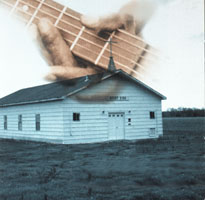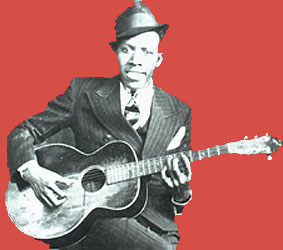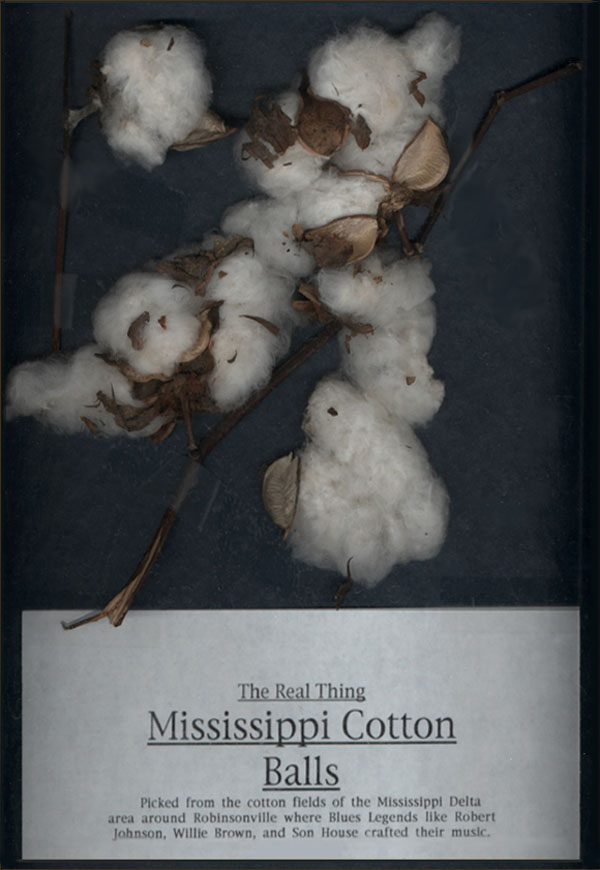Most definitely from "The
Podium"
The Anglo
Saxon-Bleeding Heart-Liberal-Blues-Roots
Schpiel
Just South across the border from Memphis, Tennessee,
into Mississippi, amidst the cotton fields and blues ridden
historical area of our country, lies the "killing fields" of a
self-indulgent nation. It is amazingly sobering. Only over the past
10 years have I become a student of the Blues and its origins. It is
fascinating. You can geographically trace it, to a great degree,
straight out of the cotton fields of the Mississippi Delta area.
While
working in the cotton fields, slaves would sing a made-up melody, to
break the boredom and to give a sense of cadence to the picking, so
that some would not work faster than others, which would cause
everyone to have to work harder. And, vice versa, to make sure they
picked fast enough. It began to take the form of "statement and
response". That is, one guy would call out a chant and the others
would answer with the same routine, then he would continue on to the
next phrase, similar to the military marching routine of, "SOUND OFF
(sound off) SOUND OFF (sound off) 1-2-3-4, 1-2 ........ 3-4)
STATEMENT and RESPONSE. Course, it wasn't so much up-tempo like
marching, considering it was done in the cotton fields, with its high
humidity and hot sun. Slower tempos prevailed and were more
reflective of the mood of the endeavor. White folks stress that they
were not mean to their slaves, (which everybody did not have,
contrary to popular belief.) and that they protected them. A common
rural perspective was that, "they were considered property like a
good mule". (Hello!
knock knock. McFly!!)
Therein was the
saving grace, AND ALSO the root of the
problem?
"Considered" is the operative word here, and human beings are what
we're talking about. In great part, it was being done along old
Highway 61, which stretches North and South, running parallel to the
MS River, all the way from Minneapolis, MN. through Memphis, TN and
on down to the Gulf of Mexico. There used to be a railroad out of
Gulfport, MS that saw a lot of hobo-ing and a lot of cotton fields
and levees. Consider the sound of that train whistle being heard by
the cotton pickers. Factor in the loneliness of the sound of it. The
Doppler effect. As the train approaches, there is a gradual increase
in pitch and volume, then as it passes you, the pitch goes down
rapidly. The nature of a bent note tends to mimic the moan of a human
voice, when in sorrow or pain. (LORD
KNOWS THIS IS HEAVY, BUT, BEAR WITH ME).
The only really cheap instrument available that you could pack in
your pocket, was the harmonica (harp). You will find that the
structure of most blues tunes are based in "Statement and Response"
with harp being the most commonly used instrument to immitate the
bending, lonely cries of the train.
|

|
In the
afternoons and evenings they used to sing the blues and,
when they didn't have the rest of the working crew to do the
"response", they would answer it themselves on the guitar or
harp. On guitar, it would be done using a kitchen knife or a
piece of broken bottleneck from some wine bottle, for
example.Many different objects were used, thus slide guitar
came to be.
|
Again, the routine
was, sing a lick, then answer it with a slide or harp, that basically
repeated the phrase, but with a little twist here and there. The
sound of the train in the background and the Mississippi river levee
behind you. The river and train both signifying boundaries, as well
as potential escape or worse, attempted escape. I've been told that
sometimes, those field songs, made of "Statement and Response"
structure, were also used as a means of communicating plans for an
escape, as well.
The blues migrated North, (as all good blues do) up the
Mississippi river to Memphis, after the war was over and the slaves
were freed. Memphis became a cultural and agricultural center of the
mid South. It also became a center for music. Surprise, surprise. The
next stop, a few years later, was St. Louis. Again, further on up the
river, and then finally spreading to the bigger cities of Chicago and
New York. During the 20's and 30's, Memphis's BEALE street, was
largely a Jazz based environment, that was gradually infiltrated by
blues musicians who made it their own. W.C. Handy, who wrote St.
Louis Blues and many other great tunes, lived there. There is a
square named after him, where, on any given day, you can find local
musicians, still playing for tips. BEALE street is in the ongoing
process of becoming commercialized, as time would have it. Still, it
is a wonderful place that I frequent (hang out, if you will) on every
visit I make to Memphis. Blues is the contemporary art form there
now. It is the moneymaker and tourist agenda. Still, it is way worth
spending a few hours down there, dreaming on it. Taking in some of
the memorabilia, the buildings, the people and the history. And, of
course, hearing the music. Yes, hearing the music. It is still there
to be had. Some of the best, often dirt poor, musicians you can hear
anywhere. Not to be looked at with condescension. Some wonderful
players. Gospel music? Yes, some of the best Black Gospel music I've
ever heard. The place I heard it in is gone now. It was called THE
RITZ. A little corner knickknack store, on the corner of 4th and
BEALE ST., that had an old upright piano and a handmade stage in the
corner. A few years ago, I heard a reverend and 3 or 4 men and women
from a black Memphis church, just doing their thing down there. No
big fanfare, not even a sign in the window saying who they were. You
could buy aspirin, a coke, maybe an Elvis T-shirt, some creme de
butol, and listen to Black Gospel music, all at the same time. Now
there's a combo for you! It was wonderful. A memory I cherish,
but it's gone now, replaced with a new building and hip looking stuff
to attract the tourist's money. I suppose that's a little "down the
nose-ish" of me, when you think about it. B.B. King's club is down on
the corner of 2nd and BEALE. I saw him play, and talked with him a
little after the show, back about '93. I hadn't seen him since we did
the "Grammy's" together in the early 70's. Riley King, a sweet man,
who has given all us pickers some stuff to chew on. He's part of my
interpretive side to this day. No apology. If I sound a little like
B.B. now and then, it's because I love him, like so many others, and
am proud of his influence.
Been wanting to correct this for years. I DO believe they are called BOLS, not BALLS. I'm white. WhatdefockdoIknow?
While in Mississippi recently, I was feeling like Ernest Hemingway Allsup,
while I was out chasing the ghost of Robert Johnson, supposed
originator of the modern day blues.
 After
a little trip to a cotton field on Highway 61, where I picked myself
a few balls (bols) of cotton, I returned to the hotel and put down some
notes. This is what
occurred to me,
as I stood there in the cotton field. Yes, this is the "Bleeding
Heart Liberal Stuff" I was referring to. So be it.
After
a little trip to a cotton field on Highway 61, where I picked myself
a few balls (bols) of cotton, I returned to the hotel and put down some
notes. This is what
occurred to me,
as I stood there in the cotton field. Yes, this is the "Bleeding
Heart Liberal Stuff" I was referring to. So be it.
9-30-99
...and as I stare
over the huge, seemingly, never-ending cotton fields of Mississippi,
the old words come to mind. "Yea, though I walk through the valley of
the shadow of death, I shall fear no evil ..." I ponder
the geography and wonder what evils occurred here, that are only
"book-tales" and "folklore" to me. How much pain and hatred were
nurtured and grown here, midst the homespun virtue of oppressive
intimidation?
As I stood there,
feeling WAY OBVIOUS, as though some long-dead African/American souls
were watching me and saying, "Don't indulge yourself by feeling bad,
as though to make amends for your ancestor's transgressions. It won't
be enough!! It's not enough to merely pause and feel some small bit
of sorrow or remorse, so that you can be comfortable tomorrow. One
pause in silence does not weigh in the balance of 200 years, and all
that it begot". And as I stood there, it was as though there were
living people, black people, watching me and thinking those same
thoughts. I plucked a few balls of cotton ... and drove away.
No better than before.
The
night before, I had stood in front of a television monitor in a Blues
Museum, located in Robinsonville, MS. I was listening to a video tape
of an elderly black man, telling his story of being born in the late
1890's in Mississippi ...... IN THE COTTON FIELDS. Born there. His
momma, after giving birth, put him in the cotton sack on her back and
continued picking cotton. Maybe an embellishment, maybe not. He was a
BLUES MAN. I heard him. WAY GOOD. Lots of pain, lots of train
whistles in his playing and voice and it brought back stories I've
heard of my own Grandma Nettie Allsup, picking cotton in the fields
of Oklahoma, pregnant and carrying a kid on her back as she went. An
embellishment? Maybe, but based in truth. Are there inconsistencies?
Life is, at best, an oxymoron of conflicting feelings. I suppose we
all have been an embarrassment to our families now and then, but
hopefully have made them proud on occasion, too. As I have been to my
parents, my ancestors are to me. Attitudes that harbor prejudice are
shameful and bathed in denial, yet the very same family are a source
of great pride to me as well. Hard working people, one and all. Of a
different BREED, of a different TIME. STRONGER. I don't think I've
ever worked a day in my life as hard as they did then. A term that
comes to mind is "Prairie Stock". Kind of a "source gene" for
America, is how I like to think of it. Inserting pride of family, to
connect myself with those that made my life possible. I wonder what
will be the defining attributes of our generation? What will those
that come after us, LABEL US AND OUR TIMES? Will they have a
perspective that will do us an injustice, because they are of a
different time, or will they see it more clearly than we do? And what
of our perspective of those that came before us? Are we capable of
truly and clearly knowing the "gospel" truth? I wonder. And, oh by
the way, this is why we call it "The Podium". When you just can't
seem to wrap it up and finish whatever the hell your point is.
---------Rambling
Rambo---------
Return
to THE PODIUM


 After
a little trip to a cotton field on Highway 61, where I picked myself
a few balls (bols) of cotton, I returned to the hotel and put down some
notes. This is what
occurred to me,
as I stood there in the cotton field. Yes, this is the "Bleeding
Heart Liberal Stuff" I was referring to. So be it.
After
a little trip to a cotton field on Highway 61, where I picked myself
a few balls (bols) of cotton, I returned to the hotel and put down some
notes. This is what
occurred to me,
as I stood there in the cotton field. Yes, this is the "Bleeding
Heart Liberal Stuff" I was referring to. So be it.